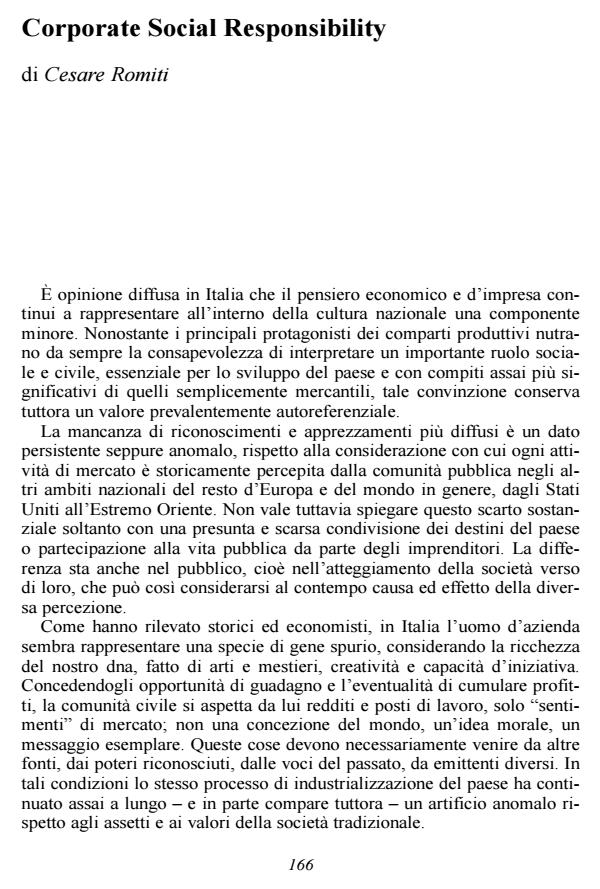Corporate Social Responsibility
Journal title SOCIOLOGIA DEL LAVORO
Author/s Cesare Romiti
Publishing Year 2004 Issue 2004/96
Language Italian Pages 12 P. File size 32 KB
DOI
DOI is like a bar code for intellectual property: to have more infomation
click here
Below, you can see the article first page
If you want to buy this article in PDF format, you can do it, following the instructions to buy download credits

FrancoAngeli is member of Publishers International Linking Association, Inc (PILA), a not-for-profit association which run the CrossRef service enabling links to and from online scholarly content.
Corporate Social Responsibility ABSTRACT: It is popular opinion in Italy that economic and business thinking represent a minor component of the national culture. This is a decidedly anomalous way of thinking compared with that met in other European countries, the USA and the Far East. This situation derives from various factors and conditions linked to ideological and religious considerations. Although removed from the protestant and Calvinist context Italy has attempted to respond to the expectations of social responsibility that supporters of laissez-faire assign to the economic system. So began a powerful process characterized by the forming of public economic corporations and of companies with state participation: a very atypical situation compared with the systems of other democratic regimes. Only recently does this process seem to have changed direction in Italy, moving towards a comforting, if gradual, reversal of trend. There are three factors which support this turnabout. First of all attention should be drawn to the evolution which has challenged the concept of the economy and the concept of business. The progressive internationalization and interdependence of markets and increasing globalization have made it very obvious just to what extent economic growth is a vital condition for social, civil, cultural and political growth. The second element is none other than the negative aspect of these same circumstances and is connected with the free circulation of people, goods and capital. This has, in fact, also demonstrated and made us appreciate the negative social effects which arise in cases of poor management. The third factor is linked to the commitment, capability and initiative of business people who have been among the first to try to create a relationship of continuous dialogue and active involvement with the community which they are part of. It is certainly evident that from the beginning the process of assimilation has been the fruit of acts of imitation more than of autonomous initiatives consciously adhering to the concepts of social responsibility. It is also true, however, that imitation is, in itself, a positive mechanism of diffusion and a powerful tool for co-optation. Clear and notable steps forward have been recorded where business people have proved themselves more sensitive to the deeper issues, seeking to respect the virtuous dual concept that guarantees not only the well-being of the company but also that of the entire social body. It is in this way that the search for profit assumes an ethical dimension. In a context such as this it is important to understand that there are no techniques, models or processes of a specific ethical mould that ensure greater earnings. Anyone can, and must, understand that the bottom line of the best results are people. Ethics are a part of the best people and they make them even more capable. It is the heads of companies and their excellent human resources that can take firms to the top. A clear and important example can surely be found in the media. The most common conviction is that the media are as the name itself suggests simply means of transmission; vehicles. This concept is linked to another traditional concept, according to which their level of correctness depends exclusively on the use one makes of it. In reality no medium is only a tool or a technical phenomenon. Telephone, newspapers, radio, television and internet to all effects connect people to the world through their description and representation of the facts, as they happen or as they decide to report them. They are not, therefore, simply methods of transmission; they produce modifications and shape their users. Consequently, for the media, it is the acknowledgement of this fact that leads to the equation of rights and duties which holds the resolution to every ethical issue.
Cesare Romiti, Corporate Social Responsibility in "SOCIOLOGIA DEL LAVORO " 96/2004, pp , DOI: